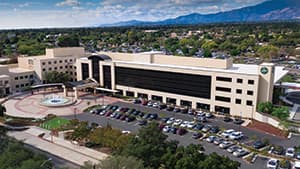
Learn About Cancer
What is cancer?
d0997723-9901-4924-8aa7-152b43a79987.jpg?sfvrsn=2e94dd58_8) Cancer is a group of diseases that involves abnormal cell growth. Cancer occurs when normal body cells grow out of control and
mutate. These cells can form tumors and migrate or spread to nearby tissues or even travel to distant sites, such as an organ far from the original tumor's location. This growth, mutation, and spread of abnormal cells can lead to serious health complications.
Treatment for cancer typically involves one or more of the following therapies: surgery, chemotherapy, radiation therapy, immunotherapy, and targeted therapy.
Cancer is a group of diseases that involves abnormal cell growth. Cancer occurs when normal body cells grow out of control and
mutate. These cells can form tumors and migrate or spread to nearby tissues or even travel to distant sites, such as an organ far from the original tumor's location. This growth, mutation, and spread of abnormal cells can lead to serious health complications.
Treatment for cancer typically involves one or more of the following therapies: surgery, chemotherapy, radiation therapy, immunotherapy, and targeted therapy.
Cancer treatment depends on several factors, including the type and stage of cancer, individual tumor markers found on the cancer, the patient's age, overall health, and personal preferences.
The most common cancers in the United States are breast, prostate, lung, colon, skin, and stomach cancer. Other less common cancer types include pancreatic, kidney, bladder, ovarian, testicular, brain, and thyroid cancer.
What is a tumor?
A tumor is a lump, growth, or tissue mass that forms when the body's formerly normal healthy cells divide and mutate uncontrollably. Some lumps are cancer, but many are not. Lumps that are not cancerous are called benign. Lumps that are cancer are called malignant.
Cancer's distinguishing feature is its ability to spread to other body areas, unlike benign tumors. Cancer cells may spread far away from the original cancer's location. These malignant cells can spread to other body parts, such as nearby lymph nodes or other organs.
What causes the cells to mutate?
- During the normal cell division process, DNA is copied to make a new cell; sometimes, an error can occur during the copying process of cell division, leading to a mutation.
- DNA may be damaged by harmful substances in our environment, such as the chemicals in cigarette smoke or UV radiation from sunlight.
- A mutation can also come from inherited genetic changes. To learn more about genetics and cancer, click here.
Does the body have any natural defenses against cancer?
The body normally destroys damaged DNA before it can develop into a tumor. This is just one of the functions of your immune system. However, the immune system can be impaired by: poor nutrition, other disease processes, autoimmune disorders, stress, advancing age, and repeated exposure to toxic or carcinogenic substances that eventually overwhelm your body's defenses.
But cancer does not run in my family.
An inherited mutation is only one risk factor. According to the American Cancer Society, "Most people diagnosed with cancer don't have a family history of the disease. Only about 5% to 10% of all cases of cancer are inherited."
What is cancer staging?
When cancer is detected, tests are conducted to evaluate its size and whether it has metastasized from its original location. This evaluation is called the cancer's "stage."
Typically, cancer is staged from 1 through 4. Stage 1 or 2 means the cancer is small and has not spread or has only spread to adjacent tissue very close to the original tumor site. While stage 3 means it is larger and has spread further, and stage 4 means it has spread or metastasized to a distant site such as another organ.
The stage of the cancer is critical in selecting the optimal treatment. If you have been diagnosed with cancer, discuss your stage with your oncologist and how it helps to determine your treatment options and prognosis.
If you or a family member has a cancer diagnosis and would like to learn more, please get in touch with San Antonio Regional Hospital's Oncology Nurse Navigator at 909.920.6265 to schedule a one-on-one oncology education class where you can get answers to all your cancer questions.
Classes are FREE of charge and open to our community in person or via Zoom.
Cancer Center Quick Links
